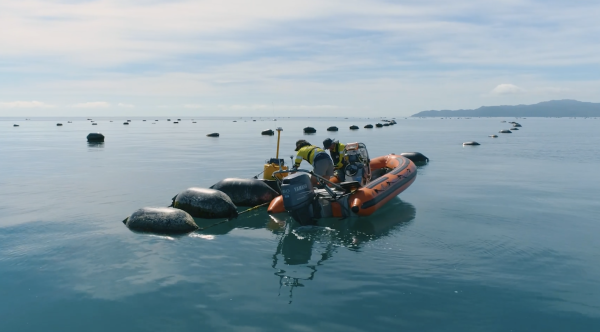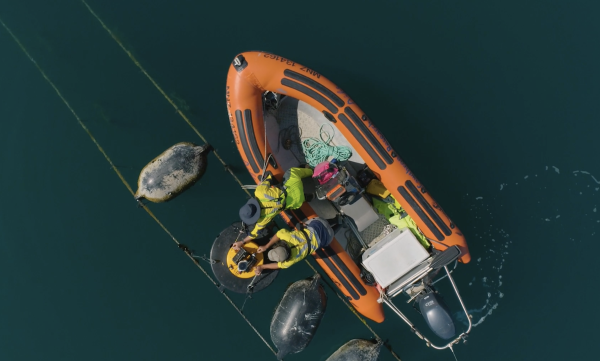Ending with impact: Organising Oceans of data to grow our blue economy
SfTI researchers are engineering data to combine multiple streams of real-world and modeled data to build a world-first three-dimensional picture of the ocean. This will help Aotearoa’s aquaculture farmers capitalise on the potential of the blue economy by transforming into a knowledge-driven industry.

Image: Sensor technology developed as part of the original Spearhead being deployed to a mussel farm in Golden Bay.
This project, called ‘Ocean Intelligence’, is part of a $7 million suite of SfTI funding to enable our most promising Spearhead research projects to ‘end with impact’. All National Science Challenges, including SfTI, will draw to a close in June 2024 and the focus is on delivering all possible real-world benefits. In the 2022 funding round, our Spearhead projects were invited to put forward ideas that have germinated during their work of the past few years, and that with more time and investment could reap impactful rewards.
The Ocean Intelligence team is utilising a suite of tools including novel sensors and data engineering technologies developed as part of SfTI’s $5 million Precision Farming Technologies for Aquaculture Spearhead research project. These sensors will collect the data for a digital dashboard for ocean farmers enabled by project partner Oceanum’s cloud-based data platform and analytics engine. This will produce a far more comprehensive and useful data-driven view of the ocean than is currently available to the NZ aquaculture industry.
Cawthron’s Chris Cornelisen, will lead the project and says that the blue economy is a huge opportunity for New Zealand.
“Here in New Zealand, we have a massive ocean estate. Aquaculture is a huge opportunity to sustainably grow Aotearoa’s blue economy and the dollar value we’re talking about adding to that economy is tremendous, we’re talking billions.”
“Here in New Zealand, we have a massive ocean estate. Aquaculture is a huge opportunity to sustainably grow Aotearoa’s blue economy and the dollar value we’re talking about adding to that economy is tremendous, we’re talking billions.”
The ‘blue economy’ encompases activities that both benefit from and look after the ocean. Aquaculture is one example of that, but it is one that has been recognised as having huge economic potential with a government set growth target of $3 billion in annual revenue within the next ten years
You can’t farm in the dark
 Key to supercharging the New Zealand aquaculture industry is reducing the cost of navigating the wild and dynamic growing environment. For marine farmers, not surprisingly the recent trend towards remote working has not caught on, as they need to be physically on the farm to monitor their gear and crops. Chris says that marine farmers are limited by the costs and challenges involved in checking and servicing their farms in ever-changing and challenging conditions.
Key to supercharging the New Zealand aquaculture industry is reducing the cost of navigating the wild and dynamic growing environment. For marine farmers, not surprisingly the recent trend towards remote working has not caught on, as they need to be physically on the farm to monitor their gear and crops. Chris says that marine farmers are limited by the costs and challenges involved in checking and servicing their farms in ever-changing and challenging conditions.
“Marine farmers cannot just walk out to a paddock to see the condition of their farm. Farmers put a huge effort into understanding the environment, the gear and the state of the crops themselves. This all has to be monitored and it costs thousands of dollars taking a boat out to manually check.
“Giving ocean farmers the intelligence they need to make decisions and farm remotely will enable farming at scale and adaptability to ever-changing conditions. Combining fit-for-purpose sensor technologies with Oceanum’s cloud-based data platform and analytics engine will create a step-change in the breadth, diversity and volume of ocean data, and the ability to solve urgent problems through data science.
“It’s the ocean equivalent of Agritech and presents a double win opportunity - grow aquaculture while growing NZ’s ocean technology sector. In the future a farmer will be able to experience what is going on in their farm virtually from land and this not only allows them to make better data informed decisions, but also to do it in a more cost effective way that allows them to scale sustainably.”
Collaborating to understand our ocean
One of the key features of SfTI’s ending with impact funding phase is that projects must have a grounding in Vision Mātauranga and deep connections with industry. The Ocean intelligence team has long standing relationships with marine farmers including Maclab, a green-lipped mussel nutraceutical producer based in Tasman Bay and Golden Bay, and Maori-owned companies such as Wakatū.
“We work closely with the marine farmers and iwi so we know what the main challengesare in the industry and the environment. They are the people who have an in-depth understanding of farming in the marine environment and we want to build on this with data science,” Chris says.
Heni Unwin (Ngāti Tūwharetoa, Ngāti Kahungunu ki Wairoa, Rongomaiwahine, Ngāi Tūhoe, Te Atihaunui-a-Papaarangi) is an early career researcher and Vision Mātauranga lead on this project and has developed non-invasive mussel sensors as part of the previous Spearhead project. Heni is part of Cawthron’s Maori research team, Te Kāhui Āio, who have been working on strengthening relationships with iwi aquaculture organisations.
As data collection and prototyping for this project is centred in Te Tau Ihu the project is partnered with Ngāti Rārua. Ngāti Rārua are already addressing issues in the moana of Te Tau Ihu by collating data on the condition of the moana.
Heni says, it's important the project builds deep and authentic relationships that link the research to the long-term future aspirations of Ngāti Rārua.
“The usual ‘this is what I’m trying to do, and this is what I need from you’ doesn’t work with Māori,” Heni says.
“You need to e huri o ringa ki raro – turn your hands to the soil, put your time and effort into doing the hard work first by understanding your Māori community, what’s important to them and how your science skills can help with problems that require science solutions.
“You need to e huri o ringa ki raro – turn your hands to the soil, put your time and effort into doing the hard work first by understanding your Māori community, what’s important to them and how your science skills can help with problems that require science solutions.
Making sense of oceans of data
Managing director of project partner, Oceanum, Peter McComb, says that to support growth in the aquaculture sector we need to ensure the industry is well informed about the environment they are working with. However, there is often too much information for a human to sort through and make robust decisions about complex operations with multiple dependencies. The Ocean Intelligence project seeks to move the dial by augmenting existing human knowledge and wisdom with modern data science disciplines.
“People are really good at understanding context but struggle to deal with volumes of data, while computers can rapidly turn data into information, but that comes without the meaningful context that only humans can provide. We want to bring these processes together and use the best of both worlds.”
“The Oceanum team are the data science glue for the project - you’ve got the knowledge from the iwi and the knowledge from the marine farmers, and the knowledge from Cawthron - and we have our own knowledge about the physical environment. The tech that will make this work is the data engineering and data science deployed to create a decision-making framework for the industry. ”
The project is funded for $1,093,900 to March 2024. Read about all of our ending with impact projects.